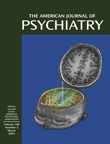Controlled Clinical Trial of Interpersonal Psychotherapy Versus Parenting Education Program for Depressed Pregnant Women
Abstract
OBJECTIVE: Antenatal depression is a significant risk factor for postpartum depression, with a 10%–12% prevalence in all pregnancies. Rates of depression are higher for pregnant women with chronic stressors, financial and housing problems, and inadequate social support. Despite the prevalence and associated family and infant morbidity, there are no controlled clinical treatment trials regarding this topic, to the authors’ knowledge. APA has identified treatment of depression during pregnancy as a priority for clinical guidelines. METHOD: A 16-week bilingual controlled clinical trial compared a group receiving interpersonal psychotherapy for antepartum depression to a parenting education control program. Fifty outpatient antepartum women who met DSM-IV criteria for major depressive disorder were randomly assigned to interpersonal psychotherapy or a didactic parenting education program. Thirty-eight women remained in the study and were included in the data analysis. Depressed mood was measured with the Edinburgh Postnatal Depression Scale, the Beck Depression Inventory, and the Hamilton Depression Rating Scale. The Clinical Global Impression (CGI) and the Hamilton depression scale measured recovery. RESULTS: The interpersonal psychotherapy treatment group showed significant improvement compared to the parenting education control program on all three measures of mood at termination. Recovery criteria were met in 60% of the women treated with interpersonal psychotherapy, according to a CGI score of ≤2. In addition, there was a significant correlation between maternal mood and mother-infant interaction. CONCLUSIONS: Interpersonal psychotherapy is an effective method of antidepressant treatment during pregnancy and should be a first-line treatment in the hierarchy of treatment for antepartum depression.



